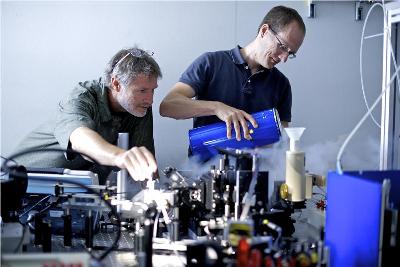Researchers at the Swiss Light Source (SLS) at the Paul Scherrer Institute (PSI) are studying the possibility of making Germanium to emit laser light.
 Peter Friedli and Hans Sigg preparing the experiment at the Infrared Beamline at the SLS for determining the laser properties of Germanium. (Photo: Paul Scherrer Institute/F. Reiser)
Peter Friedli and Hans Sigg preparing the experiment at the Infrared Beamline at the SLS for determining the laser properties of Germanium. (Photo: Paul Scherrer Institute/F. Reiser)
If this scenario is achieved, it will revolutionize streaming of data within computer chips. In order to turn the semiconductor material Germanium into laser emitting material, an external force is required to strain the material.
In the investigation conducted so far, the negative effect of the unfavorable balance between loss and amplification in Germanium has not yet favored the possibility of it being used for emission of laser light. Application of an external force may overcome this property. PSI researchers collaborated with other researchers from the Politecnico di Milano and ETH Zurich. The Swiss National Science Foundation (SNSF) has provided support for the project.
The Gordon Moore law states that for every two years, the computing power of computer chips will double due to doubling in surface density of transistors in the chips. The law seemed to be valid since the inception of integrated circuits for micro-processors in 1960. However, over the last decade 'Moore's Gap' has been observed. Modern chips have more individual processors or cores that have the ability to communicate relatively slowly. This has led to the 'Moore's Gap.'
PSI scientist, Hans Sigg, stated that this gap can be addressed using "optical data transfer" which transfers information through laser pulses, resulting in faster transfer of data. For this, tiny lasers are required and these must be small enough to be built into the chips.
Germanium lasers hold the possibility as they can be combined with silicon which is used for manufacturing chips. Silicon does not have the ability to emit light. The researchers used a powerful laser to stimulate Germanium and used infra-red radiation to study the changes. Germanium was found to behave like conventional laser materials and overcoming its negative effects through application of external forces may enable it to be used in computer chips.
The study has been published in the journal Physical Review Letters.